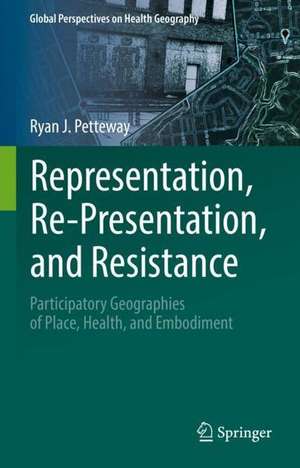Representation, Re-Presentation, and Resistance: Participatory Geographies of Place, Health, and Embodiment: Global Perspectives on Health Geography
Autor Ryan J. Pettewayen Limba Engleză Hardback – 24 sep 2022
| Toate formatele și edițiile | Preț | Express |
|---|---|---|
| Paperback (1) | 634.71 lei 6-8 săpt. | |
| Springer International Publishing – 25 sep 2023 | 634.71 lei 6-8 săpt. | |
| Hardback (1) | 562.47 lei 38-45 zile | |
| Springer International Publishing – 24 sep 2022 | 562.47 lei 38-45 zile |
Din seria Global Perspectives on Health Geography
- 15%
 Preț: 659.70 lei
Preț: 659.70 lei - 15%
 Preț: 635.65 lei
Preț: 635.65 lei - 18%
 Preț: 990.13 lei
Preț: 990.13 lei - 15%
 Preț: 629.10 lei
Preț: 629.10 lei - 18%
 Preț: 898.13 lei
Preț: 898.13 lei - 18%
 Preț: 887.83 lei
Preț: 887.83 lei - 24%
 Preț: 669.94 lei
Preț: 669.94 lei - 18%
 Preț: 894.46 lei
Preț: 894.46 lei - 5%
 Preț: 911.95 lei
Preț: 911.95 lei - 5%
 Preț: 1105.61 lei
Preț: 1105.61 lei - 18%
 Preț: 949.42 lei
Preț: 949.42 lei - 24%
 Preț: 580.27 lei
Preț: 580.27 lei - 24%
 Preț: 957.30 lei
Preț: 957.30 lei - 20%
 Preț: 548.76 lei
Preț: 548.76 lei - 18%
 Preț: 940.09 lei
Preț: 940.09 lei - 24%
 Preț: 783.99 lei
Preț: 783.99 lei - 18%
 Preț: 777.20 lei
Preț: 777.20 lei - 24%
 Preț: 656.83 lei
Preț: 656.83 lei - 24%
 Preț: 648.81 lei
Preț: 648.81 lei - 18%
 Preț: 891.65 lei
Preț: 891.65 lei - 18%
 Preț: 742.16 lei
Preț: 742.16 lei - 18%
 Preț: 906.96 lei
Preț: 906.96 lei - 18%
 Preț: 457.33 lei
Preț: 457.33 lei
Preț: 562.47 lei
Preț vechi: 703.09 lei
-20% Nou
Puncte Express: 844
Preț estimativ în valută:
107.63€ • 112.37$ • 89.08£
107.63€ • 112.37$ • 89.08£
Carte tipărită la comandă
Livrare economică 31 martie-07 aprilie
Preluare comenzi: 021 569.72.76
Specificații
ISBN-13: 9783031061400
ISBN-10: 3031061403
Pagini: 140
Ilustrații: XXII, 140 p. 41 illus., 34 illus. in color.
Dimensiuni: 155 x 235 mm
Greutate: 0.45 kg
Ediția:1st ed. 2022
Editura: Springer International Publishing
Colecția Springer
Seria Global Perspectives on Health Geography
Locul publicării:Cham, Switzerland
ISBN-10: 3031061403
Pagini: 140
Ilustrații: XXII, 140 p. 41 illus., 34 illus. in color.
Dimensiuni: 155 x 235 mm
Greutate: 0.45 kg
Ediția:1st ed. 2022
Editura: Springer International Publishing
Colecția Springer
Seria Global Perspectives on Health Geography
Locul publicării:Cham, Switzerland
Cuprins
Chapter 1. Refining and (Re)Defining “Place” in Health Research: Interrogating Spatial Knowledges + (Mis)Representations.- Chapter 2. Spatial Knowledge, Representation, + Place-Health Narratives: Youth Photovoice Perspectives on a “Food Desert”.- Chapter 3. Placescapes + Public Housing: Towards a Critical Understanding of ‘Place’ + ‘Placemaking’ in Place-Based Health & Housing Strategies.- Chapter 4. The Real Limits of Imaginary Lines: A Participatory Activity Space Method for Exploring Intergenerational (Dis)Connections Between ‘Place’ and Health.- Chapter 5. Place, Health, and the Geography of Embodiment: Intergenerational Participatory Research for Representation/as Resistance in The Ville.- Chapter 6. Towards Decolonizing Place-Health Research: Placemaking, Power, and the Production of “Place”-Health Knowledge.
Notă biografică
Dr. Ryan J. Petteway is a social epidemiologist and assistant professor in the OHSU-PSU School of Public Health in Portland, OR. His applied research integrates social epidemiology, critical theory, decolonizing methods, and community-based participatory research (CBPR) to examine notions of place, embodiment, and placemaking in community health and development, making use of information and communication technologies (ICTs) to democratize research and practice processes.
More broadly, his scholarship engages: 1) notions of epistemic, procedural, and distributive justice within public health knowledge production processes—including considerations of power and (mis)representation in data collection, analysis, and use; 2) applications of critical theory to examine dominant discourse/narrative frames of “health equity”, e.g. considerations of power and epistemic equity; and 3) pervading ethical frames of public health law and police powers.
Dr. Petteway is also an award-winning poet, including a National Poetry Month Prize, a Paper of the Year Award, and a Pushcart Prize nomination. His works have appeared in both academic journals and traditional poetry presses.
He is an alum of the University of Virginia, University of Michigan, and University of California, Berkeley.
Textul de pe ultima copertă
This book draws on the author's ten years of participatory work to examine core themes of (mis)representation, re-presentation, and resistance within place-health research and practice. The book includes practice- and research-based projects with implications and applications for practitioners (e.g. local health department epidemiologists) and academics, introducing readers to an array of new and mixed-methods within place-health research. It also introduces new conceptual and analytical place-health frameworks that more explicitly account for power—both within place making, unmaking, and remaking processes, and within the (re)production of place-health knowledges. Across six chapters, the author reports and reflects on a selection of research projects, raising key considerations in regard to place-health (mis)representation, and highlighting the value of participatory methods and processes in re-presenting—and decolonizing—spatial narratives of health. This includes an emphasis on theintegration of community-based participatory research (CBPR) principles with the technological and procedural affordances of information and communication technologies (ICTs). With each chapter drawing from CBPR, decolonizing, social epidemiology, health geography, Black feminist, and critical theory orientations, the book offers an integrated call and framing for a critical examination of how geographies of “place” and health—and narratives/stories therein—are constructed, and perhaps might be de/re-constructed through inclusive and equitable research practices that center community and offer a mode of resistance for the production of place-health counternarratives. The book is intended for academic researchers and practitioners in public health and health geography fields, particularly those whose work engages social epidemiology, urban planning, and aspects of community development, and will also appeal to researchers and practitioners who use participatory, community-inclusive methods and processes in their work, especially as related to community mapping.
Caracteristici
Emphasizes inclusive methods and processes rooted in principles of community-based participatory research (CBPR) Integrates CBPR and information and communication technologies (ICT) for studying place-health Includes practice- and research-based projects with implications and applications for health practitioners and academics
